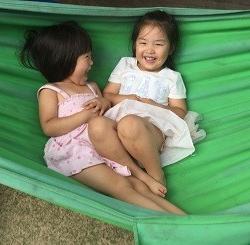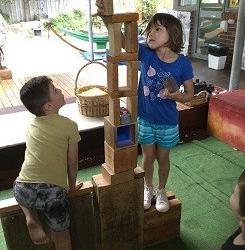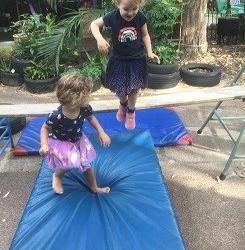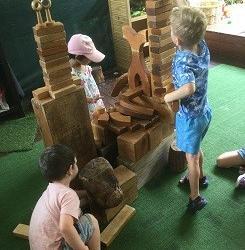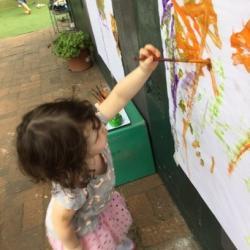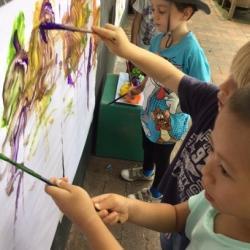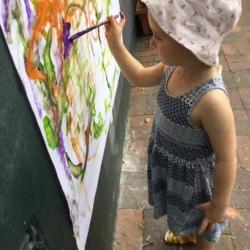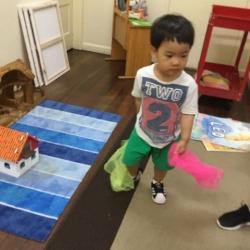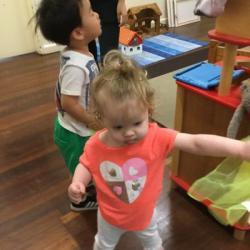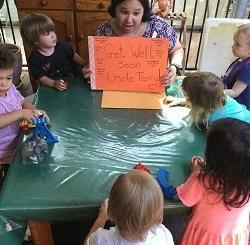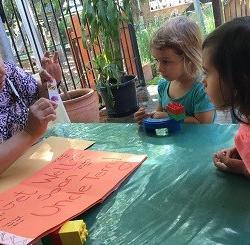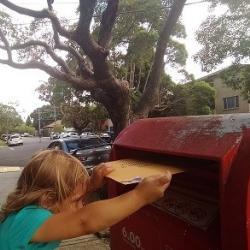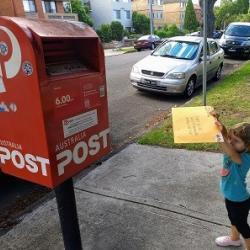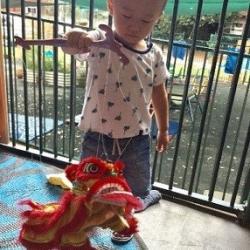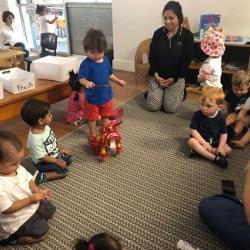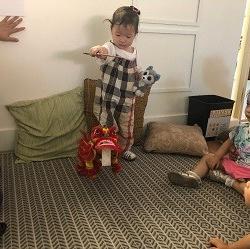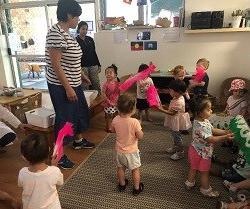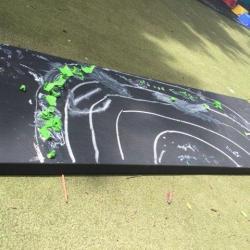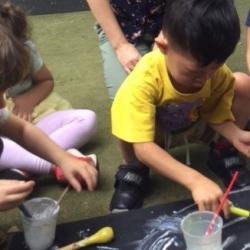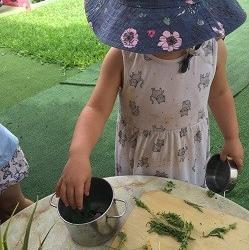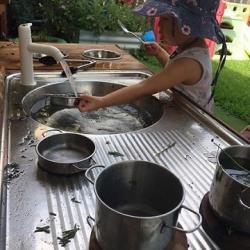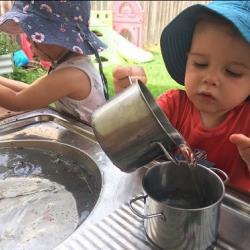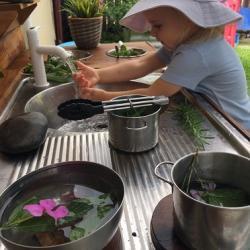Gorton House
In Gorton House we recognise that trusting, secure and meaningful relationships play a significant role in every child’s sense of security, belonging and connection. Supporting the building of trusting and supportive relationships is always at the forefront of educators’ practise. We recognise that how we facilitate and support children through times of transition or change, for example, transitioning from one room to another, or from preschool to formal schooling, often impacts children’s experiences. In Gorton House preschool we have been astounded and pleased with the enthusiasm, joy and comfort that children from the toddler’s room have shown in settling into the preschool space. With transitioning children welcomed to visit the preschool space any time they wanted (and gosh, did they want to!) many of the children had virtually transitioned themselves even before their ‘official’ transition date. During these visits, educators engaged with children with the intention of beginning to build the connections that would lead to trusting and secure, reciprocal relationships. We worked to build the same, authentic relationship with families, as we strove to understand each child/family context and their unique interests and needs. We know that authentic relationships take time to build, but the seeds are planted in those very early days.
We worked equally hard to support existing relationships amongst children, as well as supporting new relationships between transitioning children and those that are spending their second year in the preschool room. We are seeing many of these new relationships flourishing. We acknowledged and celebrated the transition of our big pre-schoolers off to big school, as well as the difficulty often felt when saying goodbye to friends. We recognise all the research that tells us that children learn best, and flourish, when they feel safe, and experience consistent and secure relationships. Research also tells us that a play-based, hands-on and child-led program with a focus on relationships and social emotional learning gives children the foundation necessary to navigate relationships and learning all through their lives, and that this is what most impacts a child’s transition to formal schooling.
We were so heartened when just last week a parent returned to visit preschool room with her child who had just started school. She relayed that the teacher had commented on how well settled and prepared her child seemed and asked which preschool the child had come from. When the parent mentioned The Infants’ Home, the teacher commented that this was fantastic, and that they knew of The Infants’ Home and had found that children who had come from here seemed secure, happy, settled, enthusiastic, very well prepared and just ready for school.
We felt enthused knowing that by respecting children’s childhoods and valuing play and children’s interests as the medium through which they learn, not only are we advocating for childhood, we’re also preparing children with the skills to make connections, to include and be included, to engage in reciprocal, respectful relationships, and to think, reflect and, of course, learn. School readiness? Yes! Readiness for life? Absolutely!
Johnson House
Toddlers
Shake it up high
The children in Johnson House toddlers are very eager to sing and dance along to music. This week, to extend the children’s existing interest in dancing, the educators offered the children the opportunity to choose to dance with scarves. The children were very enthusiastic as they moved and danced with the scarves, and they enjoyed dancing to The Wiggles. As the children moved they were shaking the scarves fast and slow, shaking them up high and down low. They also twirled their scarves around in the air. As the children were engaged in the experience, they were facilitating the development of their gross motor skills, using the large muscles in their legs and arms as they moved and held onto the scarves. The children were also building on their cognitive skills as they were learning about opposites such as fast and slow.
Preschool
Painting is always an area of interest for the children in Johnson House preschool. This week we used painting as an opportunity for children to work together on a communal artwork, with a focus on collaboration, turn-taking and building an awareness of others. Recently we have had some new faces in our program, and experiences such as these help the children to experience a sense of belonging. The children begin to build relationships with others through common interests and learn to communicate their ideas and work together, all of which helps enhance their social and emotional wellbeing.
Murray House
Sending Uncle Terry a ‘Get Well Soon’ card via ‘snail mail’
Once they finished making a get well soon card for Uncle Terry, the children gathered to discuss the next step: How do we get the card to Uncle Terry? “Take it to his house!” one child suggested. “Uncle Terry get it”, added another and hid friend replied, “We give to him”.
A child spotted a yellow envelope brought by educator Alisa. “What’s that for?” she asked. Alisa explained how an envelope is used to send mail to someone through Australia Post. She demonstrated how we could fit the card for Uncle Terry in the envelope and then seal it closed. A discussion about mail, mailboxes, and post offices ensued amongst the children. “Have you been to a post office?” Alisa asked them. A child shared her experience of going to the post office – “Yes! We buy food at the post”. “How about a mailbox. Have you seen a big red box on the side of the street?” Alisa asked the children. Some of the children seemed to recall that they have a mailbox at home – “Mum and dad gets lots of things inside…papers. Some small papers they take out and read”. Alisa explained that the small papers are called ‘letters’ or ‘mail’, which are picked up from the post office and delivered to our homes by postal workers. She also explained that we can find yellow or red mailboxes on the street, where we can place our mail to post, just like the card that we want to send to Uncle Terry.
Alisa then invited the children to write Uncle Terry’s address on the letter and attach two stamps, as we need to pay the post office to deliver our mail. One of the fathers agreed to help his daughter to pop our card in the mailbox on their way home in the afternoon. We hope that Uncle Terry will be happy to receive our mail and will come back to Murray House soon!
Rigby House
Recently Rigby House children have been celebrating Lunar New Year. They have recreating the sounds of the drumming and cymbals using pots and pans because, according to tradition, the loud sounds will scare away the evil spirits. They have been enjoying getting to know the Lion puppet, and have been making it dance along to the music. One of our educators also brought in her special fans used for dancing, and we have been enjoying using them. What a lovely way for our young children to experience these interesting Lunar New Year traditions.
Robinson House
At Robinson House the children have been revisiting discussions about their feelings and emotions with each other as well as with educators. We have been focused as a group on building relationships and sharing through conversations about ourselves and family. This helps us learn about each other and to talk through our feelings and emotions.
Recently the children expressed how colours can also represent emotions and feelings and how rainbows are beautiful because all the colours are included. This has enabled us to also have discussions about how unique and special each and every one of us is. The children have also shared what their favorite colours are, and discussed and how talking and sharing what or how we feel can at times can also sometimes help us feel better.
We decided to work on creating a rainbow artwork that reflected all our feelings and was something we could work on over time as a project. This artwork is an extension of the integrated work the team have been doing with the children. This teaching enables us to support the children’s sense of belonging and competence, as well as embracing children as active participants in their community. This project will also extend our overall learning and development in the areas of creative arts, social and emotional, language and literacy, physical development and critical thought processing and cognition.
Family Day Care
The children at Educator Lourdes’ Family Day Care Sydney Wide service have been demonstrating a strong interest in outdoor, open-ended and sensory play throughout the summer months. To extend on this interest Lourdes has included a mud kitchen into the environment. The children spend time moving around their environment with confidence and ease as they add and mix water, dirt, grass and a wide variety of different herbs from their flourishing garden. The benefits of mud kitchen play in the early years include:
- It encourages creativity (emotional development)
- It builds problem solving skills (cognitive development)
- It uses fine and gross motor skills (physical development)
- Children practice listening and taking turns (social development)
- It invites inclusive, playful learning opportunities (social, emotional, cognitive, physical).
